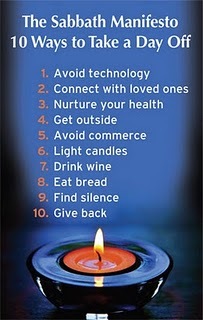
Ed. Note: The blog post below gives a moving and inspiring reason behind finding a modern way to take in the power of the Sabbath even in our secular, busy lives. Lori Shaer’s words come from our ten day experiment in counting up to Shavuot by sharing personal reflections on each of the ten commandments from members of the nominated slate for the TBS Board of Trustees. Please add your thoughts to this or any of our posts. Do you find a way to observe a moment of rest during the busy week? How do you balance the pace of modern life with the instruction to have a day of rest?
The fourth commandment says –
Remember the Sabbath Day and keep it holy.
Six days you shall labor
and do all of your work.
But the seventh day is a Sabbath of the Lord your G-d
you shall not do any work
you, your son or daughter, your male or female slave,
or your cattle, or the stranger who is within your settlements.
For in six days the Lord made
heaven and earth
and sea, and all that is in them,
and He rested on the Seventh day
therefore the Lord blessed
the Sabbath day and hallowed it.
Now I ask you, would anyone like a 48-hour day? Perhaps once a week? Maybe once a month? I know I sometimes would. I have often thought to myself, “Oh, if I just had a little more time to do this or a little more time to finish that.” But we all know that our work is never completely done. Whether our work consists of taking care of children and a home, putting together business deals, doing medical research, creative writing, or teaching, our work is never completely done. True, a home can be clean, business deals can be signed, a new drug can be developed, a book can be published, and a teacher can witness a student graduating. But there is always laundry to do, new deals to be made, more diseases to cure, more words to share, and certainly more things to teach. Our work, therefore, is never really DONE.
Everything in our lives certainly cannot be measured in what we have done. Sometimes it is just as important to measure what we have not done and acknowledge that sometimes we just need that break or that rest.
In the book, Broken Tablets, Rachel Mikva quotes Rabbi Gunther Plaut’s teachings when he said, “We must understand that doing nothing, being silent and open to the world, letting things happen inside, can be as important as – and sometimes more important than – what we commonly call ‘useful.’” The Sabbath is the ultimate statement that the world does not own us.
A great pianist, Artur Schnabel, was once asked by an ardent admirer: “How do you handle the notes as well as you do?” The artist answered: “The notes I handle no better than many pianists, but the pauses between the notes – ah! that is where the art resides.”
Rachel Mikva then says, “In great living, as in great music, the art may be in the pauses.” Surely one of the enduring contributions that Judaism made to the art of living was Shabbat, “the pause between the notes.”
In our home when we light Shabbat candles on Friday nights, and pause, our kitchen may be disorganized from a busy end of the week. One recent Shabbat while lighting candles our phone rang, but it was not answered. And whatever trinket of one our children may have in his or her hands, it is put aside for some family time and to welcome Shabbat. Our children have helped me become a better and more observant Jew and I have learned that even when everything isn’t done, it’s ok to pause, reflect, and have some sacred time for yourself and your family.
Some of life’s most important and treasured moments come when we are not working, when we pause, when we listen, and when we just watch, even if our work is not yet done.
The gift of the Sabbath allows us this sacred time.
-Lori Shaer
This post has been contributed by a third party. The opinions, facts and any media content are presented solely by the author, and JewishBoston assumes no responsibility for them. Want to add your voice to the conversation? Publish your own post here. MORE
